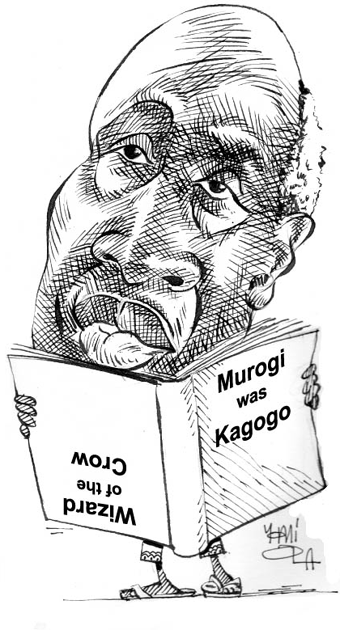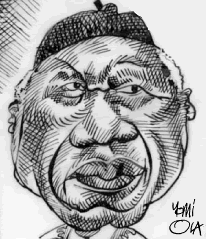









Alex Smith
Amanze Akpuda
Amatoritsero Ede
Amitabh Mitra
Ando Yeva
Andrew Martin
Aryan Kaganof
Ben Williams
Bongani Madondo
Chielozona Eze
Chris Mann
Chukwu Eke
Chuma Nwokolo
Colleen Higgs
Colleen C. Cousins
Don Mattera
Elizabeth Pienaar
Elleke Boehmer
Emilia Ilieva
Fred Khumalo
Janice Golding
Lauri Kubuitsile
Lebogang Mashile
Manu Herbstein
Mark Espin
Molara Wood
Napo Masheane
Nduka Otiono
Nnorom Azuonye
Ola Awonubi
Petina Gappah
Sam Duerden
Sky Omoniyi
Toni Kan
Uzor M. Uzoatu
Valerie Tagwira
Vamba Sherif
Wumi Raji
Zukiswa Wanner
![]()
Credits:
Ntone Edjabe
Rudolf
Okonkwo
Tolu
Ogunlesi
Yomi
Ola
Molara Wood
![]()
A Nobel for Ngugi at 70 |
|||||||||||
| As Ngugi wa Thiong’o, the acclaimed African novelist, playwright and performance theorist, turns seventy, 5th January 2008, there is speculation on the possibility of another African Literature Nobel, this time going to East Africa’s most famous writer. There have so far been prize-winners of the Nobel from North, South and West Africa, but none from the East African area. Though the Nobel Prize for Literature is not awarded on a quota basis, geographic spread remains an important factor in the literature award. Some Africanists might wish for an African ‘Nobel’ for the Kenyan writer, who is ideologically committed to the African way, but the range of annual awards from the Swedish Academy remains the most centred and useful reward for excellence and lifetime achievement in writing. Beyond the matter of the Nobel, however, there is already much honour for the immensely productive life of an author of about 30 books, including many novels and essays. Born in Kamiriithu, 5th January 1938, the former devout Christian known as James Ngugi reacted against the colonial experience by rejecting both his name and faith in 1976. His first published work was a play, The Black Hermit (1963), produced for the first time in 1962. A novel, Weep Not Child (1965) would begin the process of his imaginative engagement with the colonial experience and the political and moral crisis of African modernity. Apart from the novels for which he was much acclaimed, Ngugi wa Thiong'o wrote plays, some for community or open theatre performance, and some children's fiction. But as an Africanist and one of the great pathfinders of modernity in African literature, he is just as much honoured for the many essays, lectures and speeches he published, the campaigns he led and causes championed. A Distinguished Professor of Comparative Literature, Ngugi is Director at the Centre for Writing and Translation, University of California, Irvine. He held previous teaching, research and writing positions in some other American universities , and also in Makerere, Uganda, and University College, Nairobi, Kenya. As a result of official state displeasure at his 1997 Gikuyu play, Ngaahika Ndeenda (I Will Marry When I Want), he was imprisoned. A novel in Gikuyu, Caitaani mutaraba-Ini (1980), later translated as Devil on the Cross, and a book of prison diaries, Detained: A Writer's Prison Diary (1981), were the productive results of this experience. In 1988, he would go on self-exile to England, and later to the United States, after fears about the safety of his life in Kenya mounted following his release for prison. His latest novel, Murogi was Kagogo, 2004 (translated into English as Wizard of the Crow, 2006) was shortlisted for the 2007 Commonwealth Writers' Prize. Ngugi returned to Kenya from exile in 2004, but
was again forced to flee back to the United States soon after his
return as a result of a robbery in his family home, in which he
personally suffered, his wife too. In her tribute to the author
written for this issue of African Writing, Professor Emilia Ilieva,
an Ngugi scholar, says: "I do not hesitate to say that Ngugi
represents a historical force." Indeed, of such unique importance
is this writer in the development of what we understand today as
African literature. |
|||||||||||
 |
|||||||||||
| Michael Portillo, a British defence minister in the conservative government of former Prime Minister, John Major, has been announced as Chairman of the 2008 Judging Panel for the Man Booker Prize for Fiction. Portillo has since moved into broadcasting and writing since resigning as a parliamentary politician. The others 2008 competition judges are Louis Doughty, a novelist; Hardeep Singh Kohli, a broadcaster; Alex Clark, an arts journalist and James Heneage, Founder of Ottakar’s Bookshops. The Man Booker Prize, started in 1969 as The Booker Prize, so 2008 is the 40th anniversary year. It is given to honour excellence in fiction for novels published in Britain in the given year, and the judge’s decisions are often closely observed and sometimes contested in the media. Anne Enright won the 2007 prize with The Gathering. Among African writers previously honoured by The Man Booker Prize are Ben Okri, who won it in 1991 with his book The Famished Road, J. M. Coetzee, a winner in two years with Life and Times of Michael K (1983) and Disgrace (1999), and Chinua Achebe, who was shortlisted in for his novel Anthills of the Savannah in 1987. Out of the local British Booker Prize idea, grew
the Man Booker International Prize, an award for lifetime achievement
in fiction writing, which was won this year by Chinua Achebe. The
Caine Prize for African Writing, now so well known, and sometimes
referred to as the African Booker, was also established to honour
writers of short fiction from Africa. It has been an important annual
means of identifying excellent new writing and writers from the
continent and its diaspora. The 2007 Caine Prize was won by Monica
Arac de Nyeko, a Kenyan.
|
|||||||||||
|
|||||||||||
Illustrations:
Yomi Ola |
|||||||||||


